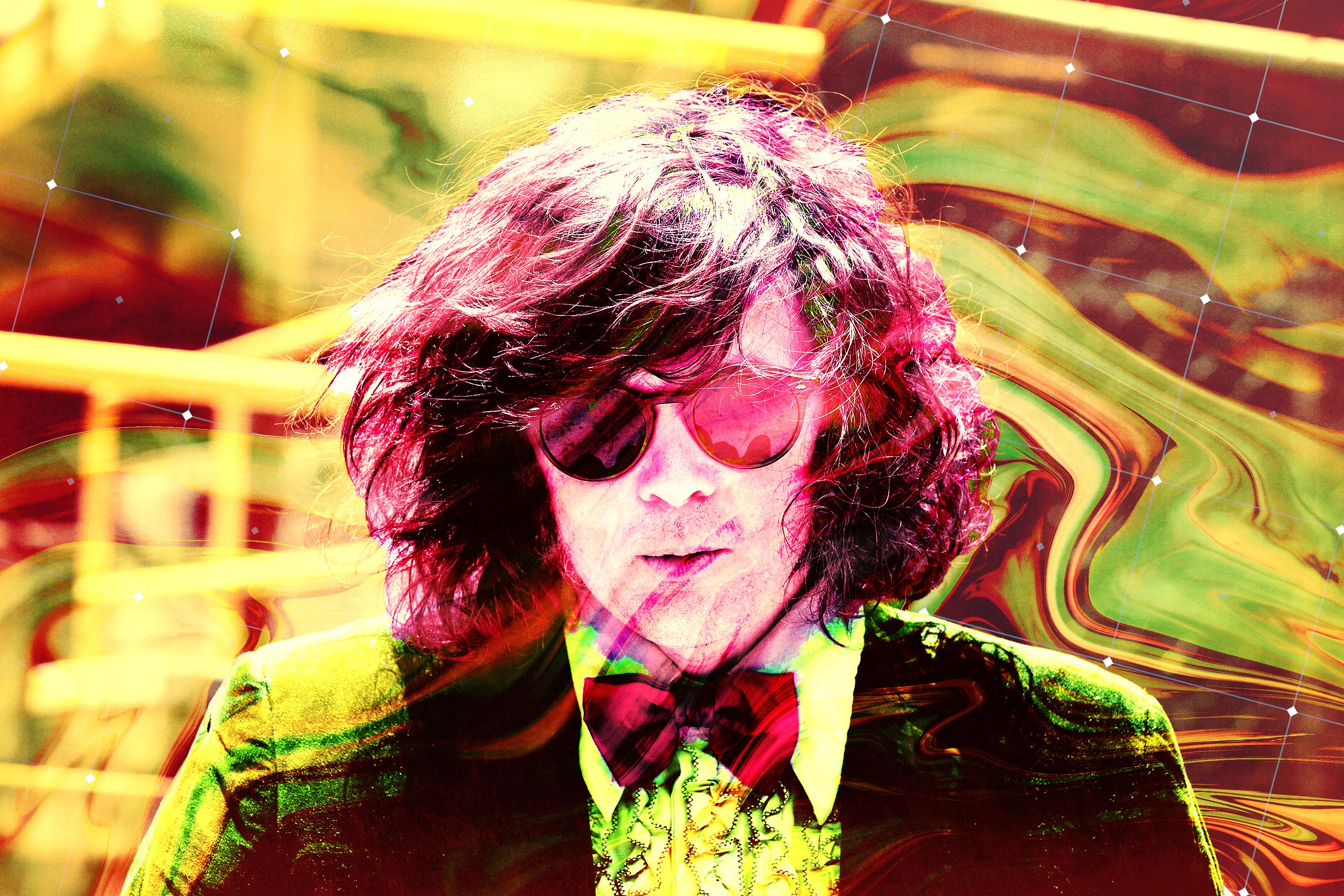
James Alex really means it. It meaning all of it. He forgives you for assuming, upon first, second, and probably even 200th contact with his Philly-born rock ’n’ roll band Beach Slang, that he didn’t really mean it. It meaning any of it. “I remember even ex-people in the camp just, like, thought it was just a show, or it had to be a joke,” he concedes, relaxing backstage in November. “And I’m like, now we’re years deep into this, and it’s a pretty long con if this is what I’m doing.”
Meaning his let’s-set-the-night-on-fire gutter poetry, his ragged guitar-bashing and beer-swilling grandiosity, his aching street-rat sincerity. Meaning a slangy disposition that compels him to describe various old bandmates as “ex-people in the camp.” Meaning the ferocious aura of optimism and togetherness he exudes in a time with no time for any of that shit.
“There’s honesty in these neon lights / We’re animals, drunk and alive / I swear right now I’m all right,” he rasped on a song called “Too Late to Die Young,” a rare placid moment on Beach Slang’s gloriously rowdy and frighteningly vulnerable 2015 full-length debut, The Things We Do to Find People Who Feel Like Us. He meant it. “When I die / Bury me in the clothes of my youth,” he grunted the following year on “Art Damage,” a typically boisterous moment on an album called A Loud Bash of Teenage Feelings. He meant that, too, despite being in his early 40s at the time.
Of course he forgives you for doubting him. “I just try to radiate a joy that at some point, even the pessimist will be like, ‘I’m tired of being pissed off and bummed out. What is this guy’s secret?’” Alex says. There is a “Rock and Roll Is Here to Stay” patch on his jean jacket, worn over his Big Star hoodie. The secret is that he means it.
Beach Slang’s third album, out Friday, is called The Deadbeat Bang of Heartbreak City, which is, impressively, Alex’s silliest and maybe raddest title for anything yet. “Got a dime-store strut / A cold-gin stare / I’m a loaded gun / With a sawed-off sneer / You betcha,” he grunt-rasps on a song called “Bam Rang Rang.” There is a righteous cowbell; there is an unexpected surge of cocksure bravado; there is definitely the raddest guitar riff he’s unleashed on this modern, cynical, rad-guitar-riff-deficient world yet.
It is a frigid Wednesday night backstage at the Palace Theatre in Columbus, Ohio, and in an hour or so, Alex will kick off Beach Slang’s endearingly sloppy gig opening for the Goo Goo Dolls by bellowing the lines, “The night is alive, it’s loud, and I’m drunk!” At least two of those things will be true. Then he’ll announce, “We are here to punch you dead in the heart, Columbus!” Then he’ll joke that people say he looks like “if Jack White, Angus Young, and Harry Potter had a kid!” (“And Willy Wonka!” someone in the crowd yells.)
Then Alex tells us, “If you’re in a rock and roll band, and you’re not having a whole hell of a lot of fun, then you’re doing it wrong!”
Then: “I’m so drunk and so in love with all of you!”
Then: “When I was a kid, I wanted to be three things: Marc Bolan from T. Rex, a good kisser, and kind!”
Then, addressing another heckler, as the defiantly seated crowd there to see the Goo Goo Dolls greets Beach Slang with an icy mixture of indifference, bemusement, and alarm: “We’re horrible?! Your job is horrible!”
Also, somewhere in there, Alex will take off his pants.
None of that seems likely to happen an hour or so earlier, backstage, where Alex is holding court in as gentle and unregal a manner as possible. In the early ’90s, back when he was unleashing loud bashes of teenage feelings as an actual teenager, he played guitar in Weston, the dirtbag pride of Bethlehem, Pennsylvania. Alex didn’t wear pants onstage a lot of the time then, either. Weston never made it big, or, unlike Beach Slang, at least not “opening for the Goo Goo Dolls (and Jawbreaker, and Jimmy Eat World, and Dashboard Confessional)” big. But The Things We Do to Find People Who Feel Like Us was, to a certain strain of rock ‘n’ roll lifer whose pantheon of gods spans from Thin Lizzy to Van Halen to the Replacements to the Pixies to Japandroids, a blockbuster revelation, a jean jacket-clad new deity ascending.
The trick now is to harness Beach Slang’s desperate and electrifying tonight-might-be-the-last-night-of-our-lives energy and use it to power a career measured in years, albums, eras, theoretical lifetimes. To carve something reliable and sustainable out of a sonic monolith to fading glory and romantic self-annihilation. (My favorite line of Alex’s to date is “Your arms are a car crash I want to die in.”) But the fact that he isn’t getting any younger is what keeps him young.
“I think I’m still of a ‘set myself on fire’ sort of mentality because I—the sands keep slipping through the hourglass, man,” Alex says. “I don’t know when the last one’s going to be. I’d hate for the last show I ever do, this thing that I’ve honestly dedicated so much to, to be like, ‘He really went out like a lamb.’”
Hence, in Columbus, the no pants, the heckler-grappling, and the fact that he ends his set by crowing, “I fucking love you so fucking much” at a crowd that largely refused to love him back before launching into an apocalyptic tune called “Atom Bomb.” First verse: “My heart is set at ‘77 / Wild nights and porno mouths / I won’t die, don’t need heaven / Too fucked up to burn out.” That guy is now on album no. 3, with an eye on a future that might one day allow him to generate album no. 10.
The first two Beach Slang albums were reliable in their crust-punk volatility, and comforting in their post-post-adolescent unease. They sounded fantastic; they basically sounded the same. “I remember finishing Loud Bash of Teenage Feelings, and it was a very, very distinct feeling of like, ‘That’s done, that narrative,’” Alex says. “I’ve said it now, and it’s connected with some people, and I’m super proud of it, but if I do that again now, I’m a fake—now I’m just trying to say the things that people expect me to say. And I just didn’t want to be that.”
Once you’ve described yourself as an atom bomb tick-tick-ticking, you can’t write another song about how you’re still tick-tick-ticking. It took longer to make album no. 3 than Alex anticipated, but “I think it gave me time to really ask myself, like, ‘OK, you’ve written that—what do you want to say now?’”
What sets The Deadbeat Bang of Heartbreak City apart from its predecessors, then, is a slight cockiness, an appealingly half-convincing fumbling-with-a-butterfly-knife surliness resplendent in consecutive tunes called “Stiff,” “Born to Raise Hell,” “Sticky Thumbs,” and “Kicking Over Bottles.” (James was inspired, in part, by “these semi-macho fantasy lyrics that Bo Diddley was so good at.”) Whether he’s actually a tough guy and whether he means it when he play-acts as a tough guy are two separate issues. (“Whip me till I choke,” he barks on “Stiff.” “Skin me like an animal.”) You believe, in that moment, that he believes it.
Alex also sought to broaden his influences on Deadbeat, or at least trigger comparisons to bands other than the Replacements, forever the gold standard in triumphal Midwestern loserdom. “I always thought about it like I was going to write a mixtape that I’d want to give somebody,” he explains of the new record, “and it would have equal parts, like, AC/DC and Cheap Trick and Warren Zevon and Kitty Wells and Paul Westerberg.”
As you can see, Westerberg’s old band is tough for Alex (or any worthy aspiring American rock star even here in—!!!—the 2020s) to get away from. To wit, beloved Replacements bassist Tommy Stinson, rock ‘n’ roll’s youngest-at-heart elder statesman, plays bass on every song on Deadbeat save for the one called “Tommy in the ’80s,” in part because Stinson felt weird playing on a song with his name in the title, even though it’s actually a tribute to power-pop icon Tommy Keene.
But the hardest, angriest, most startling Beach Slang song yet also doubles as the softest. Deadbeat is cleaved mercilessly in two by “Nobody Say Nothing,” a delicate midpoint acoustic jam in the lineage of “Too Late to Die Young,” but distinct in the band’s catalog in that it’s a savage and unmistakable excoriation of Alex’s father.
You walked out on my first breath
We were both barely alive
You chose cheap sex
While me and my mom just cried
Gorgeous cellos swoop around him, which of course only heightens the savagery.
You hung around for a year or so
And finally split for good
I don’t care much
I mean, everyone knew you would
Alex has discussed his troubled family life in interviews before: “It’s about my dad,” he told Stereogum in 2016, addressing an upbeat song called “Punks in a Disco Bar,” of all things. “It’s always about my fucking dad. He’s got a weird, crummy, magnetic pull on me.” But “Nobody Say Nothing” is as direct and as harsh as anything Alex has sung about anybody, and especially about himself.
Your blood is filthy
And stuck inside my skin
It won’t kill me
Sometimes I wish it could
“I suppose like anybody, you have parts of yourself that are kind of still yours, but then when you make things in the world, you want to be truthful,” Alex tells me. “And I’ve always said honesty and humility will be the captain of this ship, and if I can’t make good on that, I’m just sort of fibbing the people who have really given me this thing, like who really need this to matter. So I was like, ‘All right, let’s do it. Let’s make it count if we’re going to do it.’”
The end result is so visceral and unsparing that back in November, Alex still hadn’t played the song for his mom yet. “Yeah, she’ll cry,” he tells me. “She’s a tough cookie, but then that Jell-O heart. I got it from her for sure.”
The question of whether writing a song that visceral might lessen his father’s weird, crummy, magnetic pull hardly needs to be asked. “I think I might be stuck with it, man,” Alex says. “Not to be too heavy, man, but I never really got closure, because when he passed, I really tried to do the thing like, just, I really tried to have that, ‘Do you love me?’ And he just was really cold at the end. And he was scared, I get it, but I never really got the thing.”
Not even on his father’s deathbed. “I got a call from my stepmother, he was really sick, he’d been on oxygen for a while, he smoked his whole life,” Alex continues. “And I got that call, and they were like, ‘No, it’s really close. You should come. And he’s saying he won’t let go until he sees his sons.’ Like, me and my brother. The last memory I have is him and I sitting next to each other just staring out a window, and it’s like, strangers can’t become heavy-duty friends, even in the last hour. And it was just weird, and I guess I looked for something that I—it was my fault I went in there looking for something.”
What quadruples Deadbeat’s impact as a whole is that Alex is now the father of two young boys himself, settling for talking to them via FaceTime when he’s on the road, and conversely worrying, when he’s off the road, that he’s smothering them with too much love, à la Pink Floyd’s “Mother.” (Classic rock figures heavily in his every thought process, if you couldn’t tell.) In a brief tape-loop coda after Deadbeat’s closing song, “Bar No One” (“I read this thing about McCartney getting into tape loops in 1966,” Alex says), you can hear his son Oliver talking about a Daniel Tiger book with starstruck wonder. “I don’t know, there was something about the way he said, ‘It was so bright, it was so bright,’” Alex says. “It just melted me.”
“Bar No One” is a bruising ballad as well, with a gracefully insistent chorus of “Make sure I look pretty layin’ in my grave.” Alex is finally living out his rock ’n’ roll fantasies, a decade or two after he figured those fantasies were unattainable, and he’s preoccupied with the legacy he’ll leave behind, onstage and off: “It’s less of like, “‘Am I doing what I want to do with my life?’” he says. “I certainly am. But it’s like, ‘Am I doing what’s right for these folks I love a whole hell of a lot more than I love myself?’” He further illustrates the point, naturally, by flashing back to his own dad’s funeral.
“I remember when you walk up to the casket, and I smooched my birth father on the head, and I thanked him for teaching me what not to be,” he says. “And I think that now informs how I am being a dad.”
It informs everything about Beach Slang, in fact: The newfound swagger and the long-honed lack of it. “Rock ‘n’ roll’s my favorite sin / Man I don’t know if I’m good at it,” Alex sings on Deadbeat’s raucous song, “Let It Ride,” and it’s a ludicrous confession from someone on their third full-length entry in as rewarding and inspiring a catalog as exists among active rock bands.
“I won’t delve into anything depressing, but just, like, my childhood was so fucking terrible that I think it’s really hard to—I don’t even physically ever stand completely upright,” Alex tells me. He says that maybe 90 minutes before he’s onstage in Columbus, pantless and unburdened and standing as upright as his alcohol intake will allow, announcing that “loud guitars are gonna save the world one day.” Of course you know he means it, but it’s easier now than ever to actually believe it yourself. Loud guitars, after all, already saved him.

